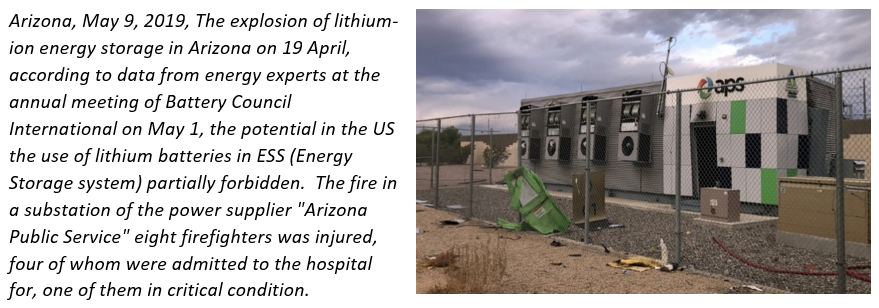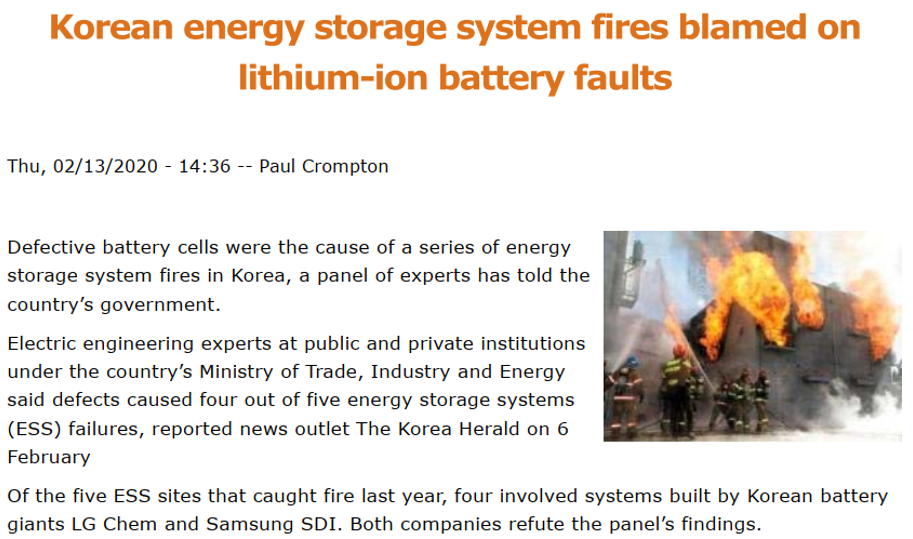A battery fire in the data center is the maximum credible accident (MCA), which you can imagine and accordingly is a hot topic for the lithium-based modern energy storage. The highly reactive lithium cells will be rightly seen as a critical element in data centers and may, therefore, be used exclusively in conjunction with a battery management system.
Lead-based batteries do not have a high energy density, such as advanced lithium batteries and are, therefore, an extremely important safety advantage for users in data centers. The low energy density ensures that it is very rare for lead-acid batteries to catch fire!
For connoisseurs of the industry, it is not uncommon that lithium is highly dangerous, but it seems politically desired that these issues are not made known overheating problems with lithium batteries. Problems with lithium batteries are not concealed but not discussed, except when it comes to lithium fires in vehicles - which the suspected influence of the automotive industry suggests in Germany: If a TESLA car is affected by a battery fire, then it appears the all-German media, less in foreign media. However, fires in a Battery Storage System - is not made well known to the world and in the press largely ignored, even if they can lead to personal injury. The consequential damages in a data center fire are significantly higher than in a vehicle fire - this can simply burn out and usually no additional installations or buildings affected.
How dangerous it can be for a data center operator shows the following press release about a fire at a very advanced utility in Phoenix AZ, whose brand-new lithium energy storage caught fire.



From 2018 -2019 More than 23 fire incidents involving lithium batteries occurred in energy storage systems (ESS) in South Korea. The companies involved were the leaders in lithium design: LG Chem and Samsung SDI - the manufacturers of the most widely used lithium cells worldwide. The manufacturers of lithium cells and fire investigators disagree on the reasons for the thermal runaways but in all cases, unbalanced voltages were found and the suggestion that this could be the cause of the fire is close. Then the South Korean fire investigators concluded that although the root cause was not found it discourages the use of lithium in ESS (Energy Storage System)!
Not just us, it seems that there could be a system Conditional Lithium act problem, and it is therefore concealed to allow time for a solution to be found.

Although the German automotive industry is making only vehicle fires of competitors known and the lithium industry, however, does nothing but praise the benefits of this emerging technology. Does the lithium manufacturer guarantee the safety and security of their products? This raises the question of whether the switch from lead to lithium batteries poses a greater risk than previously thought.
Already calling for special property insurance and fire protection measures when lithium batteries are used. This special fire protection measures based on the fact that a burning lithium battery is not easily fought with conventional extinguishing systems. Especially in data centers, this would be a significant change, further costs may be required when lithium systems are used for safety reasons.
Lead-acid batteries do have a smaller energy density and lifespan, but with proper treatment ( "equalizing/balancing") lead-acid can also, in high voltage applications, have double the lifespan than usual today and the capacity gap with lithium decreases.
So with BACS the service life can be improved on lead-acid batteries and can also be operated much safer than lithium. This will provide the data center with a safe and cost-effective energy storage solution!